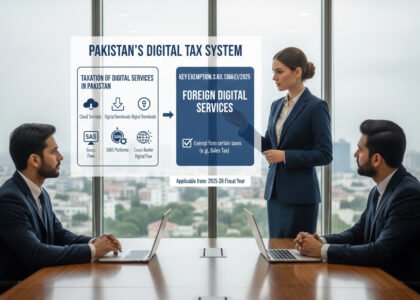SRO 1366(I)/2025 — Complete Guide to the Exemption on Digital Presence Proceeds Tax (With Practical Examples)
On 10 July 2025, the Federal Board of Revenue (FBR) issued SRO 1366(I)/2025 under Section


On 10 July 2025, the Federal Board of Revenue (FBR) issued SRO 1366(I)/2025 under Section

Navigating Pakistan’s tax system requires understanding not just the rates but also their legal foundations.


In a move to tighten financial surveillance and curb tax evasion, the Finance Act 2025

If you’re an Overseas Pakistani, there’s good news when it comes to purchasing or selling